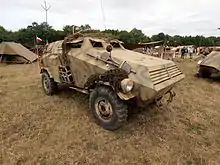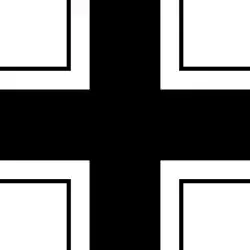Sd.Kfz. 247
Sd.Kfz. 247 (Sonderkraftfahrzeug 247) was an armored car used by the German armed forces during World War II.
| Sd.Kfz. 247 schwerer geländegängiger gepanzerter Personenkraftwagen | |
|---|---|
 Sd.Kfz 247 Ausf. B | |
| Type | Armored car |
| Place of origin | Nazi Germany |
| Service history | |
| In service | 1937–1945 |
| Used by | Germany |
| Wars | World War II |
| Production history | |
| Designer | Krupp (Ausf. A), Daimler-Benz (Ausf. B) |
| Manufacturer | Krupp (Ausf. A), Daimler-Benz (Ausf. B) |
| Produced | 1937 (Ausf. A), 1941–1943 (Ausf. B) |
| No. built | 10 (Ausf. A), 58 (Ausf. B) |
| Variants | Ausf. A |
| Specifications (Sd.Kfz. 247 Ausf. B) | |
| Mass | 4.46 t (4.39 long tons; 4.92 short tons) |
| Length | 5 m (16 ft 5 in) |
| Width | 2 m (6 ft 7 in) |
| Height | 1.8 m (5 ft 11 in) |
| Crew | 6 |
| Armor | 6–8 mm (0.24–0.31 in) |
| Engine | Horch 8-cylinder, water-cooled 3.8 petrol 81 PS (80 hp) |
| Power/weight | 18.1 hp/t |
| Transmission | 5 x 1 |
| Suspension | Coil spring |
| Ground clearance | 23 cm (9.1 in) |
| Fuel capacity | 160 L (42 US gal) |
Operational range | 400 km (250 mi) road 270 km (170 mi) cross-country |
| Maximum speed | 80 km/h (50 mph) |
Before the war, ten six-wheeled models (Ausf. A) were built; this was followed during the war by 58 four-wheeled models (Ausf. B).
Description
The Sd.Kfz. 247 had an open-topped, thinly armored body mounted on a wheeled chassis. It was unarmed as its six-man crew was not intended to fight; rather, it was intended for use by the commanders of motorcycle and motorized reconnaissance battalions, although neither version was fitted with any radios.[1] Its armor was intended to stop 7.92-millimetre (0.312 in) armor-piercing bullets at ranges over 30 metres (33 yd). Photographic evidence shows some Ausf. B vehicles were retro-fitted with a star-shaped radio antenna mounted inside the crew compartment, and an additional armor plate bolted to the lower glacis of the hull.[2]
Ausf. A
Krupp built ten Ausf. A models on the chassis of its six-wheel "Krupp Protze" truck in 1937. Its 3.5-litre (210 cu in) 4-cylinder air-cooled gasoline flat engine (Krupp M 305) of 65 hp (66 PS), gave it a top speed of 70 km/h (43 mph) and a range of 350 km (220 mi).[1]
Like all of the other vehicles that used this chassis, the Ausf. A had very limited cross-country mobility, drivers being advised to stay on roads and trails. It weighed 5.2 t (5.1 long tons; 5.7 short tons), was 5.2 m (17 ft 1 in) long, 1.96 m (6 ft 5 in) wide and 1.7 m (5 ft 7 in) tall.[3]
Ausf. B
Daimler-Benz built 58 of these in 1941—1942 on a four-wheel drive heavy car chassis (s.Pkw. Typ 1c). The front-mounted engine was an 8-cylinder, 3.823-litre (233.3 cu in) Horch 3.5 petrol engine, giving it a road speed of 80 km/h (50 mph). It had a maximum range of 400 km (250 mi).[1]
Armour
| Front | Side | Rear | Top/Bottom | |
|---|---|---|---|---|
| Superstructure | 8 mm (0.31 in)/38° | 8 mm (0.31 in)/35° | 8 mm (0.31 in)/30° | open |
| Hull | 8 mm (0.31 in)/35° | 8 mm (0.31 in)/35° | 8 mm (0.31 in)/36° | 6 mm (0.24 in) |
References
- Chamberlain and Ellis, p. 205
- Jentz, pp. 50–53
- Jentz, pp. 49–50
Sources
- Chamberlain, Peter; Doyle, Hilary L.; Jentz, Thomas L. (1993) [1978]. Encyclopedia of German Tanks of World War Two: A Complete Illustrated Directory of German Battle Tanks, Armoured Cars, Self-propelled Guns, and Semi-tracked Vehicles, 1933–1945 (Revised ed.). London: Arms and Armour Press. ISBN 1-85409-214-6.
- Jentz, Thomas L.; Doyle, Hilary (2001). Panzerspaehwagen: Armored Cars Sd.Kfz.3 to Sd.Kfz.263. Panzer Tracts. Vol. No. 13. Boyds, Maryland: Panzer Tracts. ISBN 0-9708407-4-8.
